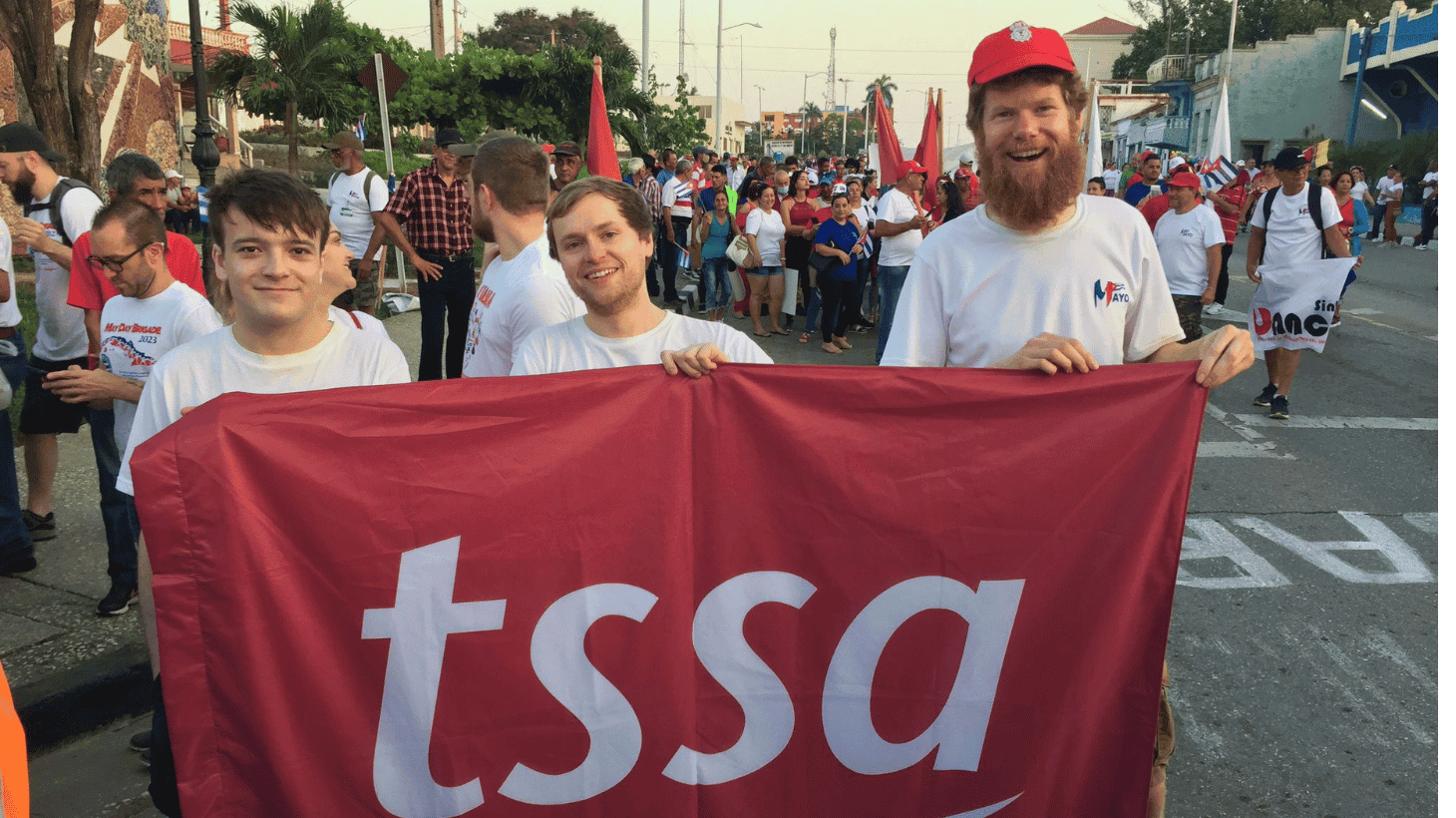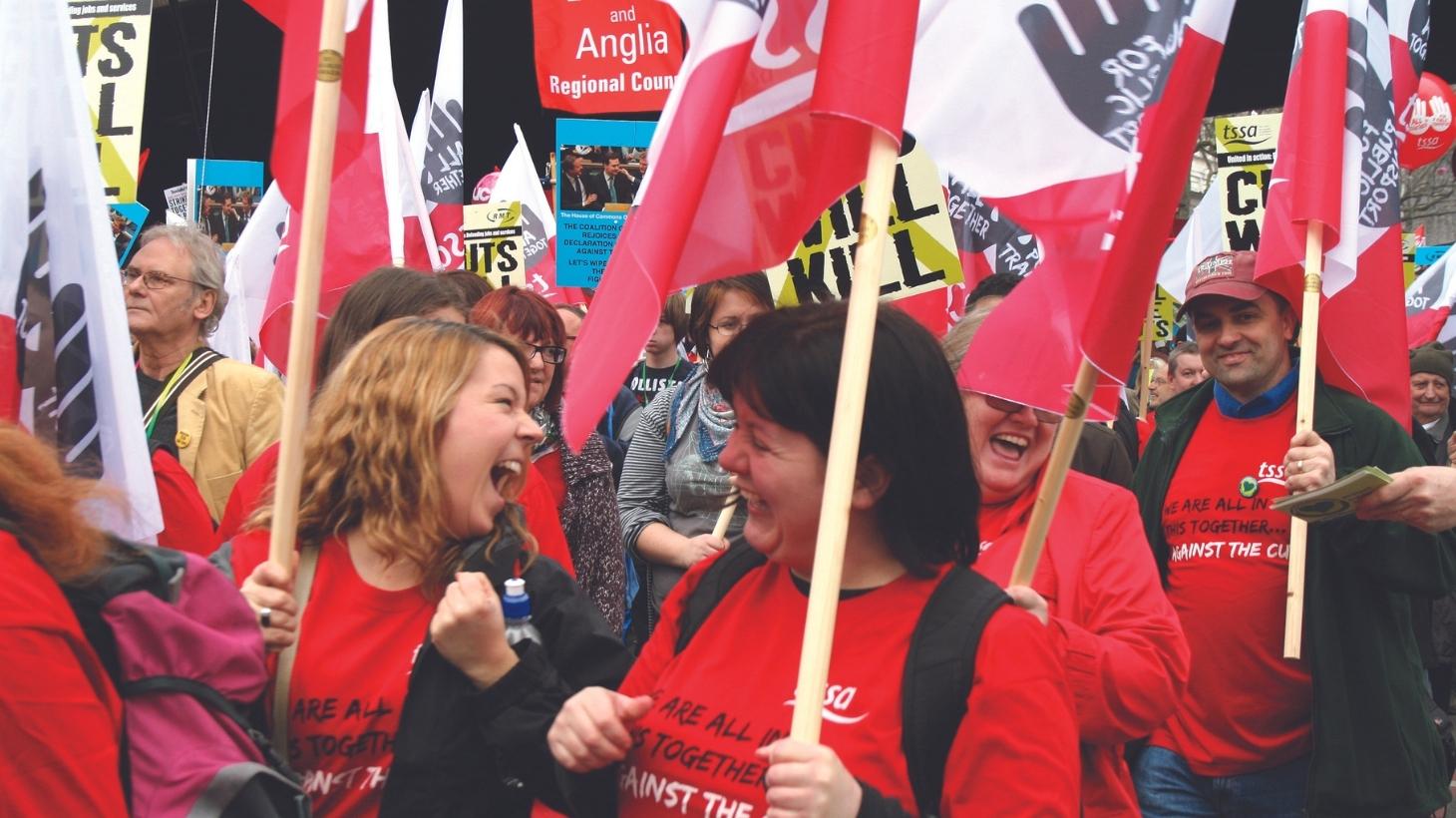Cuba Solidarity Campaign – May Day Brigade visit

TSSA has a proud history of internationalism, including affiliating to the Cuba Solidarity Campaign and regularly sending young delegates to the Young Trade Unionists May Day Brigade. Unfortunately, we were not able to send a delegate to Cuba this year, but I self-funded my trip and joined the May Day Brigade so the TSSA flag would once again fly in Havana on May Day.
The Brigade was made up of over 50 trade unionists from the UK and Ireland, who joined a larger contingent of 300 activists from around the world who visited Cuba to show solidarity and take part in a range of cultural, political education and fact-finding activities.
On the first three days we visited cooperative farms to take part in voluntary agricultural work, mainly weeding or picking crops. For the first thirty minutes my commitment to the work would have made Che Guevara proud, but then the heat got the better of me and my dreams of being a hero of soviet labour faded (why did no one warn me that the Caribbean would be so hot?).
We visited schools where we saw that education is at the heart of the Cuban revolution. Free education including higher education is a universal right that Cubans enjoy, and Cuba spends more as a proportion of its GDP on its education system than any other country in the world (double what Britain spends). The results are clear, not just in the extraordinary number of doctors and scientists trained in Cuba, but in the love of culture and the arts encouraged in children of all ages. We saw kids excited to share with us their artistic talents for dance, theatre, painting, ballet, and countless conga lines.
We attended a conference on solidarity and anti-imperialism at the Cuban parliament, where Cuban President Miguel Díaz-Canel Bermúdez spoke to us about the importance of internationalism. The President told us that whilst Cuba is continuing to progress and develop, the intensified economic, financial and commercial blockade is the main obstacle to Cuba’s economic and social development.
Break the blockade!
The US blockade against Cuba is a collection of US laws and legislation which restricts Cuba's ability to have normal trade relations with the US and other countries around the world. The US has used the blockade to try and strangle the Cuban economy for more than 60 years. It has cost the Cuban economy more than $1.3 trillion, the effects of the blockade are clearly visible when you visit Cuba – including severe shortages in necessities like food, fuel and medicines.
There was an easing of restrictions during the Obama presidency, but this détente was reversed by Trump who placed over 240 extra punitive sanctions on Cuba, and reassigned Cuba as a state sponsor of terrorism. Biden has failed to reverse most of these sanctions and so the Cuban economy is in a visibly desperate situation.
Before visiting Cuba, I thought of the blockade in economic terms – that it was having a catastrophic financial impact on the country’s ability to survive. From speaking to Cubans, particularly in hospitals and local doctors’ surgeries in barrios, it is clear that the Cuban people regard the blockade as genocidal.
The US routinely blocks lifesaving medical equipment from reaching Cuba. This reached crisis point during the covid pandemic, when the US government tightened sanctions further to restrict Cuban access to medicines, food, technology, and other essential products including face masks, ventilators, and vaccination syringes. Countless Cubans continue to die because of the actions of the US government.
The reason successive US governments are trying to break Cuba is obvious – because they are scared that the achievements of socialism will be an inspiration to other Latin American countries and to oppressed people around the world.
Despite the hardship caused by the blockade, Cubans are intent on creating a society in which social justice can thrive. We saw signs of a better world throughout Cuba: from the doctors and nurses we met who talked proudly of taking part in humanitarian work in over 30 countries around the world; to the schools and theatre groups where the artistic talents and dreams of children are nurtured; and the collective farms where workers are proud of their work because they own the fruits of their labour.
Time and again we heard inspirational stories of the Cuban people working together to achieve remarkable things despite the odds. Even in the face of the worsening blockade during the covid crisis, Cuba didn’t give in. Cuba became the smallest country in the world to successfully create its own covid vaccine and then vaccinated more of its citizens against covid than any of the world’s major nations.
The US are right to tremble at the thought of what Cuba could achieve without the blockade.
It would be wrong to romanticise the hardship of the Cuban people, no one should live without the necessities of life because of the actions of a hostile government. As trade unionists we should do all we can to end the blockade. But I couldn’t help but be inspired by the courage of the Cubans I met. I was reminded of the Nye Bevan quote about the NHS, that it will last as long as there’s folk with faith left to fight for it. In Britain I see our class losing faith, as even our right to protest or strike is stolen. In Cuba, despite the overwhelming imperialist threat, despite the power cuts and fuel shortages, despite the lack of necessities and the knowledge that the US would open the gates to these goods if the revolution fell; despite all this - people will not give in and will not surrender the achievements of socialism.
In Cuba the revolution will last as long as folk have the faith to fight for it, and long may it last.

